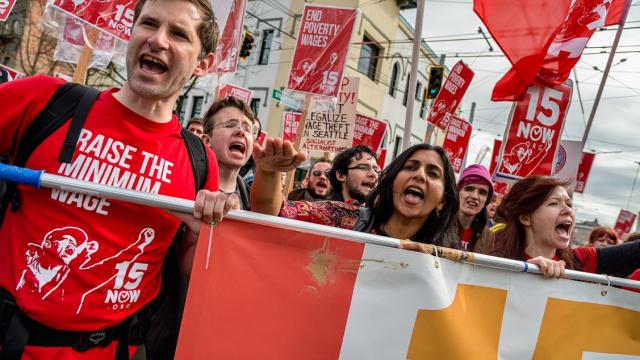
On Wednesday morning, the fast-food labor campaign known as Fight for $15 will stage what organizers say will be its largest ever protest — spanning 40 countries, including actions in 200 U.S. cities. In addition to fast-food restaurant employees, workers from a number of other industries are expected to participate and, in many cases, walk off the job.
The other participants will include airport service and retail workers as well as adjunct professors. Activists from outside of labor circles have also said they will join in on the protests, including the racial justice group #BlackLivesMatter and the environmental advocacy campaign 350.org.
The fast-food workers’ campaign launched in November 2012, when roughly 200 workers in New York City went on strike and issued what became the movement’s two signature demands: An hourly wage of at least $15 and the right to form a union. The campaign quickly spread to other cities, resulting in a series of day-long labor actions centered on those two objectives.
In some of the more recent protests, the action has spilled over both national and commercial boundaries. On May 2014, fast-food workers in 150 U.S. cities walked off the job as supporters in 33 other countries held solidarity rallies. The most recent nationwide labor action, in December 2014, included work stoppages initiated by low-wage workers outside the fast-food industry: home health care workers, airport service employees, and others.
Around the same time, other low-wage labor campaigns — such as the campaign against Walmart, backed by the United Food and Commercial Workers (UFCW) and the home health care worker organizing campaign, led by the Service Employees International Union (SEIU), which also provides financial support to the fast-food campaign — announced that they had adopted the fast-food workers’ core demands of a $15 minimum wage and unionization.
Wednesday’s action promises to be even broader, both in terms of international support and the number of other industries participating. Public statements by members of the campaign suggest it has pivoted from a focus on the fast-food industry to a much broader attack on low-wage employment throughout the United States.
"This isn’t just our fight, it’s for every hard-working person who is living on the brink,” said Corrine Hall, a North Carolina-based child care worker in a statement from the Fight For $15 coalition. "We have strength in numbers. We won’t stop until we are all paid better and we are listened to as early childhood educators."
As the movement has grown in size, it has also attracted supporters from beyond organized labor. Members of the clergy in various U.S. cities have been a perennial feature of the protests, and police-reform groups such as Blackout For Human Rights have been working with the fast-food campaign for months, citing the fact that people of color are overrepresented in fast-food jobs. More recently, the environmental group 350.org put out a statement in support of Wednesday’s protests, arguing that higher wages will make low-income communities more resilient to the effects of climate change.
“We believe that a new, prosperous clean energy economy should be one that protects the planet, protects the people who live on it, and generates millions of good jobs that pay livable wages,” said 350.org in a statement.
McDonald’s Corporation, one of Fight For $15’s main targets, has previously dismissed the campaign’s protests, saying they were "not ‘strikes,' but are organized rallies for which demonstrators are transported to various locations, and are often paid for their participation.” But in a statement provided to Al Jazeera on Monday, the company struck a more conciliatory tone, emphasizing its recent pay bump for employees at some McDonald’s locations.
“McDonald’s respects the rights of our employees to determine whether or not to join a union,” the company said in a statement. “Recently, McDonald’s USA announced a wage increase and paid time off for employees at its company-owned restaurants and expanded educational opportunities for eligible employees at all restaurants. This is an important and meaningful first step as we continue to look at opportunities that will make a difference for employees.”
3 WAYS TO SHOW YOUR SUPPORT
- Log in to post comments
















